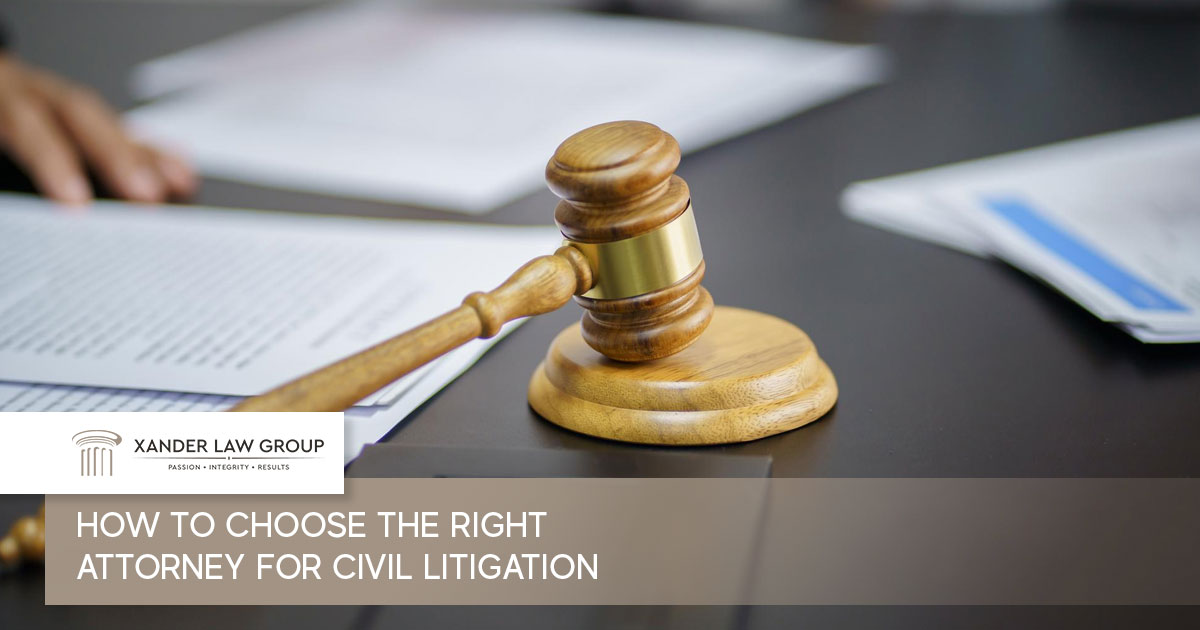How To Choose The Right Attorney For Civil Litigation
Many people associate legal professionals with criminal cases, but most legal cases in the United States are civil cases, encompassing a wide range of disputes between individuals, organizations, and government entities.
As a civilian, it’s important to understand when you may need a civil litigation attorney and how to choose the best one to help your case.
The Role Of A Civil Litigation Attorney
Civil law is a branch of law that deals with non-criminal offenses, disagreements, duties, and rights. Civil litigation is the process followed when dealing with a non-criminal dispute between two parties, helping to reach a fair and just result without criminal charges or penalties.
Civil litigation is used to resolve disputes in tort law, contract breaches, and landlord/tenant issues. These cases may take various forms, but a reputable attorney is experienced in managing the nuanced complexities.
A civil litigation attorney helps settle disputes in various ways, alleviating pressure and offering expert guidance on legal matters. Consider the following responsibilities of a civil lawyer.
- Assessing and investigating cases
- Drafting pleadings and filing motions
- Managing the deposition and interrogations in the discovery process
- Assisting with pre-trial preparation through negotiations and conferences
- Representing the client at trial and presenting evidence
- Managing post-trial matters such as motions and appeals
- Advising clients and explaining various options for resolution

When To Hire A Civil Litigation Attorney
Florida’s legal system can be complex and overwhelming, especially when presented with an insurance or legal dispute claim. While Florida law does not dictate that you need a lawyer, there are certain instances when a lawyer can save you time, money, effort, and reputational damage.
Contract Disputes
Being caught up in a breach of contract or disagreement over contract terms can involve complex legal principles and detailed documentation. An attorney’s expertise helps navigate these details and assess the case’s merits. Combined with a professional’s negotiating skills and experience in representation, you get the best chance of protecting your contractual rights and achieving a favorable resolution.
Property Disputes
Property disputes occur over real estate boundaries, ownership issues, and landlord-tenant conflicts. They can be complicated and challenging to manage fairly. An attorney offers invaluable assistance by handling the investigation, gathering evidence, handling negotiations, and providing representation in legal proceedings.
Personal Injury Claims
Tort cases can go several ways, with various possible outcomes. An attorney will use their expert knowledge and experience to maximize the chances of receiving fair compensation for your injuries. With a thorough understanding of complex medical evidence and knowledge of negligence law, having an attorney in your corner is essential for personal injury claims.

Five Tips to Hiring The Right Civil Litigation Lawyer
While there are many advantages to hiring a civil litigation attorney, the benefits are only as effective as the quality of the lawyer. So, how do you choose the right lawyer for your case?
1. Conduct Online Research
We live in a digital world, and a reputable attorney will likely have an online presence. Conducting an online search for a lawyer in your area will help you gather important information and make an informed decision.
Some key information you may discover while looking online includes case results, availability, credentials, and reviews. Confident legal teams will also share their success rates and any awards that may persuade you to choose them over a competitor. By leveraging online resources, you can compare different lawyers and choose the best suits your budget, case, and need.
2. Check Credentials And Recommendations
Don’t be afraid to ask your shortlisted lawyer about their credentials, and ensure that they have the appropriate certifications and licenses to practice in Florida. A qualified attorney will be registered with the Florida Bar Association and perhaps even earn accolades or peer-reviewed recognition.
You can also ask for any recommendations while conducting background on your chosen attorney. You may be directed toward online reviews or have the opportunity to read client testimonials. By assessing credentials and recommendations, you can gauge the attorney’s reputation and make a confident choice.
3. Assess Experience And Specialization
Not all areas of law are equal, and hiring a lawyer with the right expertise can significantly impact your case. A smart choice will be hiring an attorney with distinct knowledge, skills, and strategies that align with the details of your case.
For example, a civil litigation attorney for a personal claim will have a deep understanding of medical terminology and insurance negotiation skills. In contrast, you want to ensure an attorney is well-versed in property law and zoning regulations when handling a property dispute. Ask for the lawyer’s track record in handling similar cases, and assess whether the attorney can handle your case effectively.
4. Consider Effective Communication
When you hire an attorney, you must trust that they will represent you with integrity and strive to achieve the best results. This trust is often built on clear communication throughout the legal process. An attorney should communicate clearly and regularly, keeping you informed about the status of your case.
In addition, the attorney should be available to help with the timely handling of legal matters. From attending necessary meetings and making court appearances to meeting critical deadlines, the attorney should be available to foster a sense of trust.
5. Ask About The Fee Structure
Legal proceedings cost money and time, but there are ways to save costs, such as ensuring efficiency and assessing the fee structure. For example, some attorneys charge an hourly fee, while others work on a contingency basis. When choosing a civil litigation attorney, ask about the fee structure to understand the costs involved in the process.
Ask all necessary questions to ensure the cost aligns with your budget and expectations. Remember that an experienced attorney is a worthy investment and will increase the chances of a positive result.

Litigation Services In Miami
If you’re looking for a civil litigation attorney in Miami, begin your search with Xander Law Group. Our passionate team works with integrity to get you the best results possible. We use our resources, skills, and experience to represent our clients in complex litigation cases against individuals, big business, and government.
Our core practice areas also include business law transactions and commercial litigation. Give us a call at 305-767-2001 and chat with our friendly and professional team today.









